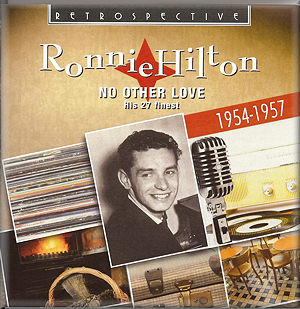 CD Reviews
CD Reviews MusicWeb
Webmaster: Len Mullenger
Len@musicweb.uk.net
[Jazz index][Purchase CDs][ Film MusicWeb][Classical MusicWeb][Gerard Hoffnung][MusicWeb Site Map]

RONNIE HILTON
No Other Love
![]() Retrospective RTR 4149
Retrospective RTR 4149
BUY NOW
£7.00
post-free
World-wide
1. No Other Love
2. I Still Believe
3. Veni, Vidi, Vici
4. A Blossom Fell
5. Stars Shine in your Eyes
6. World of Love
7. Have You Ever Been Lonely?
8. The Yellow Rose of Texas
9. Hey, There!
10. Moments to Remember
11. Young and Foolish
12. Constant and True
13. Give Me My Ranch
14. Who Are We?
15. A Woman in Love
16. I Just Found Out about Love
17. Two Different Worlds
18. By the Fireside
19. You're My Everything
20. My Blue Heaven
21. Time on my Hands
22. Blue Room
23. Penny Serenade
24. Once
25. Heart
26. Around the World
27. Wonderful, Wonderful!
There was a time, believe it or not, when the hit parade was full of songs with genuine melodies. This was before the era of boy bands, girl bands, drum 'n' bass, and recordings designed for dancing rather than listening. Someone like Ronnie Hilton was continually in the pop charts during the 1950s - and rightly so. He had a pleasant, smooth voice and friendly manner, and he was supplied with worthwhile (albeit mostly sentimental) songs after he signed a contract with HMV in 1954. His hits continued into the 1960s and later he became a valued DJ on BBC Radio 2, presenting Sounds of the Fifties.Admittedly some of his hits were songs originally recorded by American singers, but Ronnie proved that he could equal the appeal of such crooners as Bing Crosby and Perry Como.
This album contains a good cross-section of his work between 1954 and 1957 - a period which means the omission of later hits like I May Never Pass This Way Again, The Wonder of You and the awful but very popular A Windmill in Old Amsterdam. But many other successful songs are here, including his chart-topping No Other Love (incidentally, a Rodgers & Hammerstein composition), Stars Shine in Your Eyes, A Woman in Love and Around the World.Peter Dempsey's sleeve-note helpfully fills in Hilton's background: born into a working-class family in Kingston-upon-Hull and eventually reaching the big time after war service and work as an engineer in a Leeds sewing factory. Ronnie's success was aided by the backings to many of his records, like the startling opening of No Other Love and the subtly effective accompaniment to Young and Foolish. But the main architect of his success was himself, with an instantly recognisable voice, a keen interest in music, and the ability to deliver sweet songs in style.
Some of the songs he sang were slushy but they were catchy and melodically attractive. Have You Ever Been Lonely? Illustrates his care with phrasing, while a track like Hey, There! exemplifies the way that he enunciated lyrics so that you could hear every word. This album is a reminder of the days when vocalists took the trouble to project songs with an ear for both melody and lyrics.
Tony Augarde
Ronnie Hilton, born in Hull, was an engineer in a sewing factory when - just after the War - he began singing with bands in Leeds. Winning a contest in 1954 led to a one-year contract with HMV and from then on Hilton (born Adrian Hill) had one hit after another. A decade later and the balance in the music industry had shifted and Hilton was hardly alone in suffering from the explosive delights of pop. Leaner times followed, as did illness, but many will remember him from his stints as a radio broadcaster in the 1980s in particular. He died in February 2001 at the age of seventy-five.
Retrospective has delved into the golden early days and that takes in his early HMV record contract up till May 1957. All the tracks are chronological with the exception of the opener, No Other Love, which was perhaps his Biggest Hit - it was certainly a No.1 hit in the pre-pop picker's parade back in the spring of 1956.
His modus operandi was a canny appraisal of the prevailing American market and he covered a wide range of songs. He clearly liked and was influenced by such as Johnny Mathis, Perry Como, a little bit of Bing Crosby and quite a lot of (vocal) Nat Cole. It's the last that strikes me as the most pervasive influence and that's a good thing in my book.
Plenty of these songs get the heave-ho orchestral treatment from Frank Cordell and his orchestra. There's plenty of big brass and swirling strings around in, for example, I Still Believe and if there's also just a touch of the lachrymose and the stentorian then Hilton certainly had the voice to put it all across. There is some wistful Mediterranean exotica in the shape of songs by Nino Rota and Lao Carmi and a very unlikely vehicle in the shape of The Yellow Rose Of Texas which strays into reverse Dick van Dyke territory. Similarly the voguish Hey, There! hasn't worn at all well, with its inner dialogues and cocktail piano. Hilton's inclination towards tearjerkers - for example Constant And True (give me inconstant and false any day) - is balanced by the improbably gaucho-butch Give Me My Ranch. That Hilton was capable of singing more grandiloquent numbers is never in doubt but the By The Fireside collection of standards is altogether better even though some of the arrangements (Penny Serenade for a start) are less successful.
Hilton was a vibrant presence on the British scene and he took his lead from classy models. This adeptly chosen selection traces his early years with breadth and care.
Jonathan Woolf